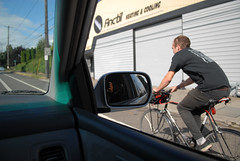Slate.com has published a very interesting, and I think important, article on why some road users have such anger toward people on bikes. In Why You Hate Cyclists: Partly because of jerks like me. But it’s mostly your own illogical mind, writer Jim Saksa delves into the psychological underpinnings of why bike riders get such a bad rap. His article is a must-read if you want to better understand why we so often hear hate-filled rants about “those crazy cyclists!”
Here’s the gist:
… lots of drivers assume all people on bikes are assholes like me. In doing so, these motorists are making an inductive fallacy, not unlike saying, “Of course he beat me at basketball—he’s Asian like Jeremy Lin and Yao Ming.” Now, you might be thinking to yourself that you’ve seen more than one or two suicidal cyclists in your day—that these roaches on two wheels are an infestation that’s practically begging to be squished underfoot (and by “foot” you mean “my Yukon Denali”).
First off—wow, that is disturbingly violent. Second, your estimate of the number of asshole cyclists and the degree of their assholery is skewed by what behavioral economists like Daniel Kahneman call the affect heuristic, which is a fancy way of saying that people make judgments by consulting their emotions instead of logic…
Every time another bicyclist pulls some… stunt, the affect heuristic kicks in to reinforce the preconceived biases. The same isn’t true in reverse: The conviction that bicyclists are erratically moving hazards is not diminished by the repeated observance of safe and respectful riding.
Saksa correctly (in my opinion) states that much of the hate we hear about on talk radio shows, in OregonLive.com and local TV station blog comments, has more to do with emotion than reality. This is something I’ve tried to explain to people (in a much less eloquent way) for a long time, and it’s why we can’t let people’s personal anecdotes become the basis for policy.
I’ve found that much of the divisiveness and anger present in our discussions about transportation projects and policies has to do with a simple lack of perspective. Most of the people I debate issues with simply haven’t spent time riding a bicycle in an urban environment. On the flip side, I have driven around this city in a car plenty of times.
Saksa nails this perspective issue:
Moreover, bicycling as a primary means of transportation—I’m not talking about occasional weekend riders here—is a foreign concept to many drivers, making them more sensitive to perceived differences between themselves and cyclists. People do this all the time, making false connections between distinguishing characteristics like geography, race, and religion and people’s qualities as human beings. Sometimes it is benign (“Mormons are really polite”), sometimes less so (“Republicans hate poor people”). But in this case, it’s a one-way street: Though most Americans don’t ride bikes, bikers are less likely to stereotype drivers because most of us also drive. The “otherness” of cyclists makes them stand out, and that helps drivers cement their negative conclusions. This is also why sentiments like “taxi drivers are awful” and “Jersey drivers are terrible” are common, but you don’t often hear someone say “all drivers suck.” People don’t like lumping themselves into whatever group they are making negative conclusions about, so we subconsciously seek out a distinguishing characteristic first.
One thing Saksa doesn’t mention, but that I feel plays a large role in peoples’ tendency to “hate cyclists” is that people on bikes are not anonymous. Because bike riders are out in the open, they are very easy to judge and attach anger to. People in cars, on the other hand, can barely be seen inside their vehicles and they are, in effect, shielded from hateful and emotional psychological scapegoating.
This is important stuff. If we are ever going to significantly (not incrementally) change the transportation status quo in America, improving our mental infrastructure will be just as important as improving our physical infrastructure.


